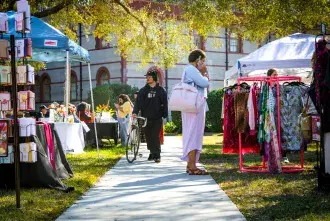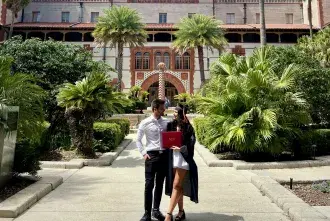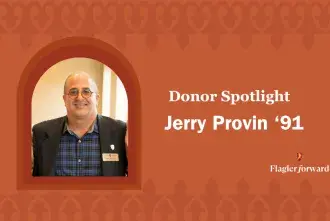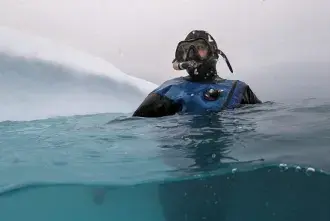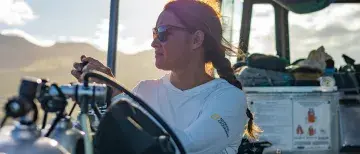
Aboard the EV Nautilus, a 68-meter research vessel, Glickley joined the 2023 Nautilus Exploration Program as a Science Communication Fellow. But Glickley is not a scientist. She graduated from Flagler College in 2002 with a degree in Elementary Education. She is the magnet program coordinator and instructional coach for teachers at Hawthorne Elementary School in Louisville, Kentucky.
"The opportunity to be a part of the research and discovery of unexplored areas in the Pacific Ocean is exhilarating, and it is even more powerful because I get to share with students back home in real-time," Glickley said.
The Nautilus Exploration Program is funded by the Ocean Exploration Trust. This nonprofit organization aims to make "pushing the boundaries of education, outreach, and technological innovation" paramount in the pursuit of scientific discovery.
Glickley is one of sixteen fellows selected nationally for the 2023 program, a search that pulled from schools, science centers, and non-profit organizations across eleven U.S. states and territories.
"Science Communication Fellows bring expertise as educators and storytellers to work alongside scientists and engineers and make discoveries about the planet," Ocean Exploration Trust's Director of Education and Outreach Megan Cook said.
Glickley said her role at Hawthorne Elementary "goes hand-in-hand with being a part of this expedition."
Every three days, Glickley will have a Zoom call with her students for a lesson about her team's current research and explanations of the live deep-sea video footage captured by the ships' remotely operated exploration units. It's a rare opportunity for Glickley and her students back home, but this isn't the first time they've been lucky enough to experience learning in this way.
Last year, Glickley submitted her name to be a part of a National Geographic-sponsored expedition on the same ship- the EV Nautilus. She was chosen and welcomed alongside a team of maritime scientists to explore biodiversity formed around WWII shipwrecks in the Pacific.
During this first research trip, she Zoomed her students several times each week to keep them up-to-date on the team's discoveries.
Glickley also capitalized on one specific experience of the expedition, finding an exciting way to engage her students when she returned.
After becoming scuba certified for the National Geographic expedition, Glickley dove with the team to explore a coral reef that had formed around a shipwreck. One of the scientists created a 360-degree video of the dive, and at the end of the school year, Glickley's students were able to use virtual reality goggles to "literally be under the water with" their teacher.
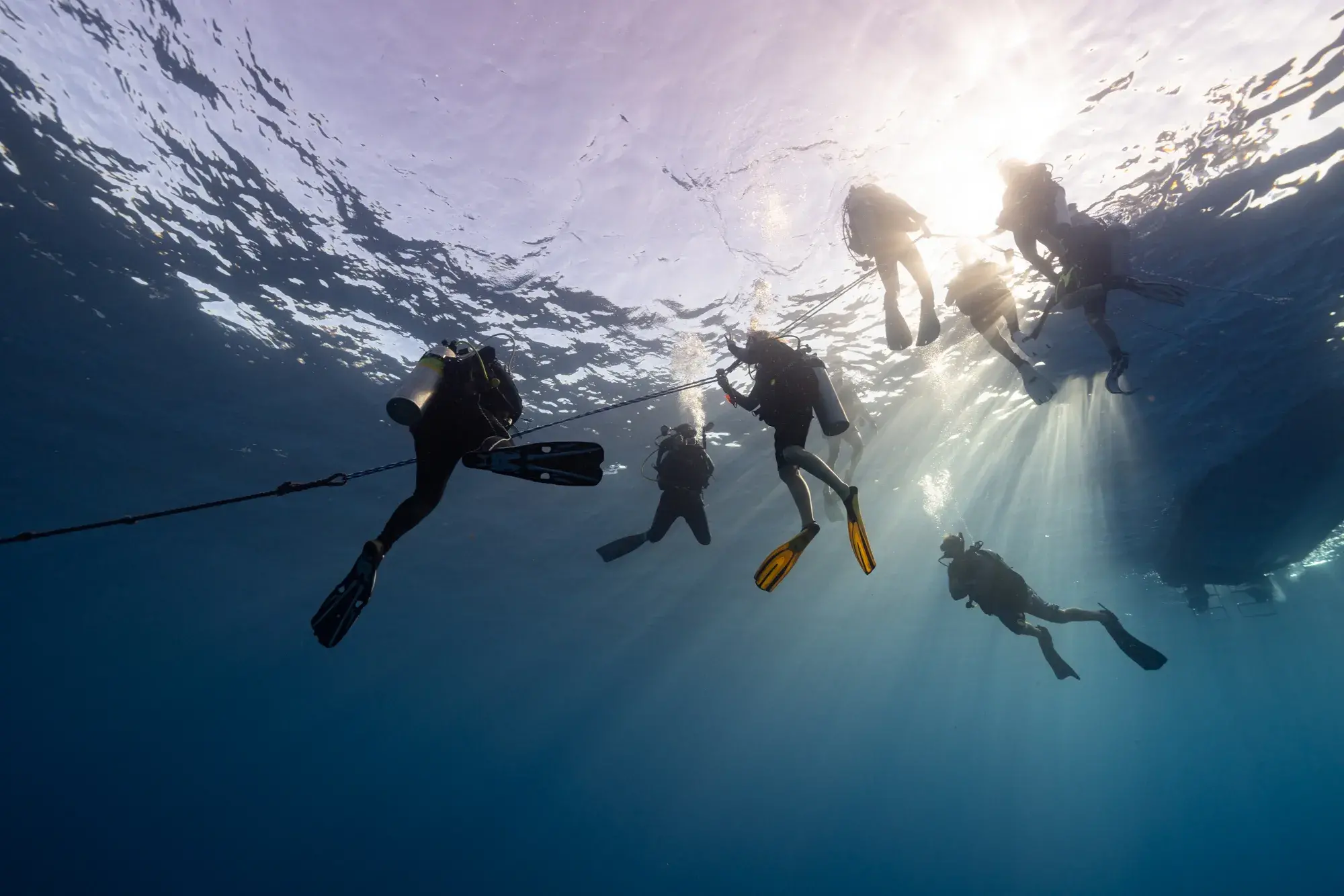
Taking advantage of these research expeditions for the benefit of her students is something Glickley does eagerly. She said it's the students who inspired her to seek out these adventures in the first place.
Hawthorne Elementary is a Spanish immersion magnet school with a mission of developing "globally and culturally competent citizens." The school's curriculum emphasizes experiential learning and bilingual instruction, elements Glickley said could be why they "started to notice that students were becoming more globally minded," thinking more about issues facing the world like climate change.
"As a fifth-grade teacher, I started to hear their concerns at school about issues that are facing us on a more global level like climate change, conservation efforts, or things they could do to protect the environment," Glickley said.
She said it became clear that a concern for the health of the planet was at the forefront of her students' minds. As a response to this curiosity, Glickley's next step was to seek opportunities for exploring the earth and understanding efforts in protecting biodiversity.
"It was definitely one of the most moving things I've done as a teacher," she said.
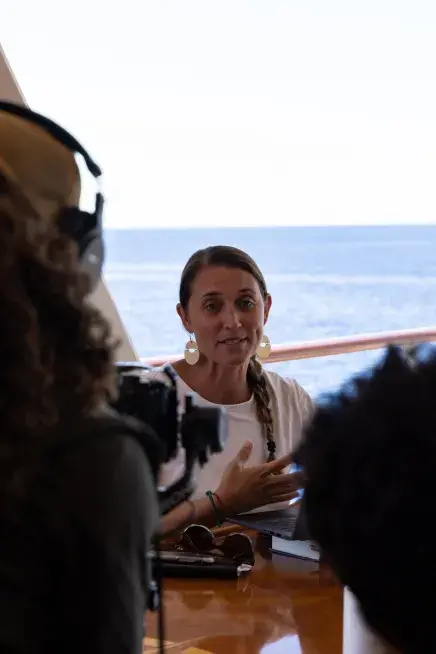
Glickley works as an instructional coach for peer teachers and with small groups of children, so she doesn't consider herself "a classroom teacher." While her role is well-suited for these long expeditions, she recognizes this is not a flexibility most teachers have.
"It's nice that I get to step away without a substitute, especially at the beginning of the school year," Glickley said. "But for classroom teachers who do want to participate, the Ocean Exploration Trust provides funding for a school to hire a substitute."
On her current expedition, Glickley may be thousands of miles from her classroom, but she is more engaged than ever with Hawthorne students and students from around the world. In addition to Zooming with her students, Glickley will be working two four-hour shifts daily. During each "watch," she hosts the online stream of the team's deep-sea footage for online viewers and virtual classes of students from around the world.
"I'm pretty much narrating what we're seeing," Glickley said.
During these shifts, Glickley said she likes to get the scientists on board involved. Sometimes, she'll ask the scientists questions in a way that will "help people without scientific backgrounds" like herself to understand what they're seeing in this deep-sea footage. There's also a chat box on the NautilusLive website for any online viewer to ask questions.
"Any teacher, from any part of the world, can submit a Google form to request" a ship-to-shore Zoom call with Glickley where she brings students up-to-speed on the current research and opens the floor to any questions.
Following her first trip with the Nautilus Exploration Program, Glickley created lesson plans around research from the expedition, took students to a nearby fossilized coral reef near a Kentucky river, and even worked with the art teacher to turn the entire library into an underwater ocean scene.
While she isn't sure what these thematic learning opportunities and activities will look like after returning from the second expedition, Glickley said it's the responsibility of educators to rethink the way teachers teach and the way students learn.
"Students have access to so much information," Glickley said. "The way that we teach needs to shift to meet their needs. We can't teach the way we did 50 or 60 years ago."
